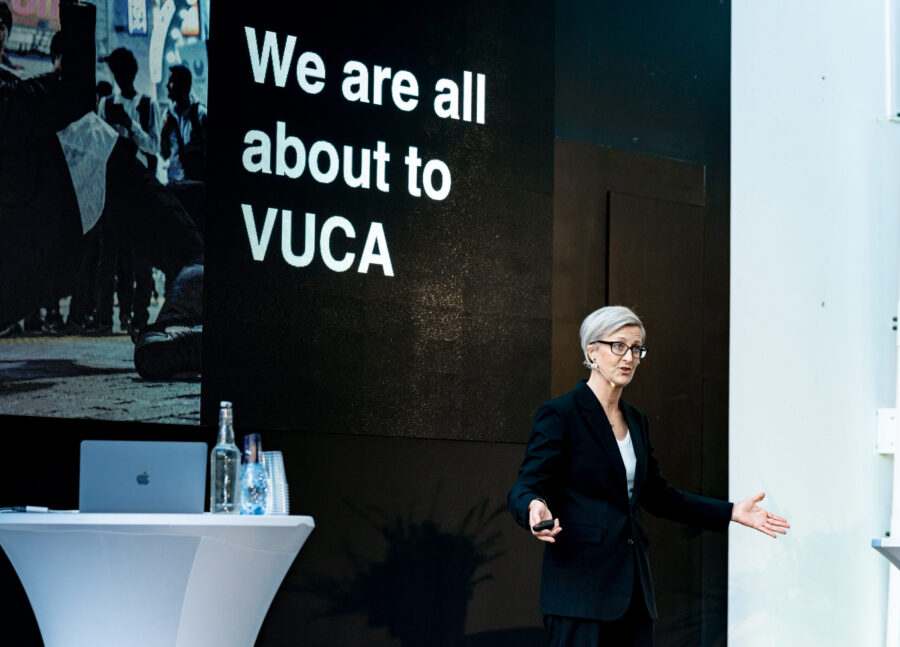We are all about to VUCA

Fotograf: Roger Nellsjö
V olatility, Uncertainty, Complexity and Ambiguity rules. NO industry can rest on its laurels. Adopt a visionary, agile, iterative approach. There is no final destination, the journey is it! But, embrace your current ways of operating – and enable a dual approach at best. And, be aware of other needs in times of real crisis.
The need for visionary leadership and more agile and iterative management approaches is not new. But in full swing now! Globalisation at large, changing consumer demands, climate change and not least the Internet of things brings on VUCA for real. VUCA sets the context and stage for how we (need to) lead and manage our organisations if not before, so now.
In a world where volatility, uncertainty, complexity and ambiguity set the norm – it goes without saying that many of the traditional paradigms guiding business management and practice only takes us so far. Rationality, control and profit are challenged by adaptability, autonomy and purpose.
The acronym VUCA was introduced by the US military already in the 90’s to describe the more volatile, uncertain, ambiguous and interconnected world developing after the Cold War and fall of the Berlin wall. At the heart of all of it, in my view, is complexity.
Complexity does not hold causal logic. As opposed to complicated – where (however difficult a problem) there is some established logic to finding answers and solutions – complex issues or problems cannot be solved in the same sense. Complexity builds on a large number of interacting and impacting issues, people, stakeholders, other actors, and events. Whether we like it or not. VUCA present boundaries – muddling or sharpening decisions as well as the capacity to look, plan and move ahead.
In a VUCA world, we have to move from a “let’s solve it” approach” to “let’s do our best to manage for it, enable it, learn from it and adapt to it” approach. When the road ahead is blurry and there may be more questions than answers – we need to rely on the knowledge and perspectives of many and yet move forward step by step – continuously iterating, learning and adjusting. Having and trusting a process is key to moving forward. Even if we do not know the answer/-s at the outset – there is always an intent, clarify it! Then, explore the options, prioritize, select, test, validate, learn, iterate and move on. Trust the process. The answers will come. If you are willing to look, listen and learn. Courage!
VUCA calls for vision and continuous navigation, rather than final destinations and fixed plans. The challenge is that many organisations and management teams still hold on to long range planning followed by execution – thinking (for a long time) first, action second. And at the same time, hold on to an internally oriented focus rather than external – praising efficiency before effectiveness, focus on current operations rather than innovation, the short term before the long-term.
BUT before you VUCA-away. Do acknowledge your current ways of running your business. The management practices coupled to VUCA – however important – may come in stark contrast to your existing approach and your current key activities and capabilities. While this appraoch may be as natural as breathing for many companies, not least on the IT- Tech- and start-up scene, many incumbents are struggling – for natural reasons. Do not fool yourself to think that your current modus operandi can, or should, be quickly forgotten whilst applying the new.
Rather, embrace both and start by building bridges – through e.g. organisational measures, through enabling a new or dual mindset and through finding new indicators for measuring progress. And have faith. It may take more of:
- Long term focus and commitment next to short
- Customer orientation rather than competitor or shareholder focus
- Horizontal rather than vertical management
- Entrepreneurial competence alongside operational competence
- Enabling of Intrinsic motivation and commitment from employees rather than reward systems
- Trust instead of control. Adaptability instead of planning.
- A culture of tempo, risk-taking and learning alongside quality-focus, low risk and pre-set evaluations
- Measuring milestones, growth and commitment as much as productivity and margins.
- Communication – dialogue based on real data and transparency – instead of one-way information
To embrace complexity I have found that most important are: Vision and a long-term focus. An open mindset and eagerness to learn from and work with others. A willingness to act, step by step, and re-direct when needed. But, it also requires a true preparedness for the best as well as the worst-case scenarios – financially as well as mentally. One beauty of a more digital world is the access to (digital) data. Real data driven dialogues and cross-analysis combined with more analogue experiences and know-how is central.
However, in times of crisis – like the current Corona pandemic – the management approach suggested above may seem particularly relevant. YET, crisis management is something else. In crisis, it is of utmost importance that e.g. entrepreneurial spirit and horizontal management that we may otherwise favour, is put aside – unless it is well synchronised. In crisis, we have to leave it to the crisis-team in charge, listen and comply! Needless to say, the crisis-team should have the competencies and perspectives needed.
In hope that we can all soon go back to a “normal”, yet, VUCA world – prepare yourself (if not there already) to step out of your comfort zone and get used to being there. It is fast, it is multi-everything and it lacks clear answers at the outset. Adopt an agile, iterative approach and break the plan forward down in pieces. There is no final destination, the continuous journey is it.
Malin
March 2020
